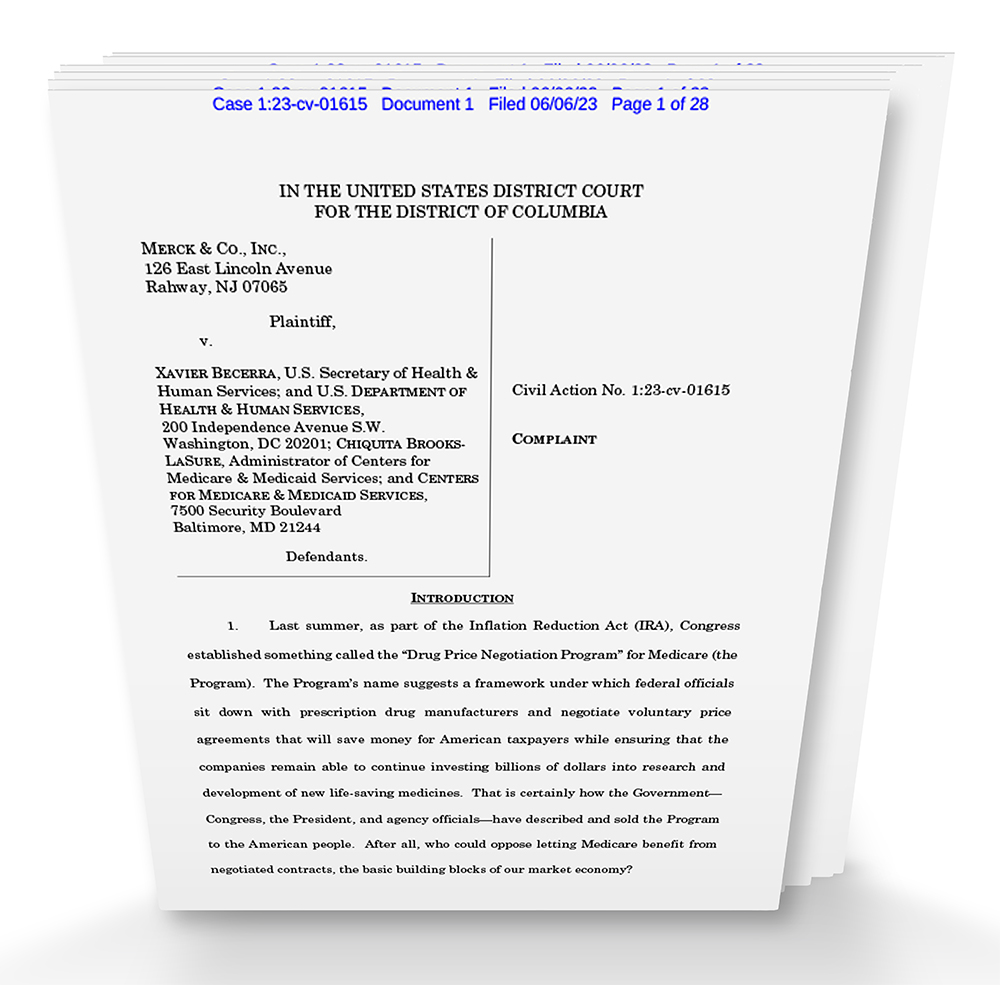With Bud Light, Target, and North Face trying to outdo each other in their “wokeness,” it is refreshing to see a company standing up for its rights and its customers—and quite forcefully.
Merck filed a lawsuit this week to stop what it called the government’s “draconian and deceptive scheme” to dictate drug prices through the ironically named “Inflation Reduction Act” (IRA) that Congress passed last August.
Democrats have been trying for decades to allow Medicare to negotiate lower drug prices for seniors. “[W]ho could oppose letting Medicare benefit from negotiated contracts, the basic building blocks of our market economy?” Merck asks in its filing.
But the government’s drug price program and CMS’s implementing guidelines are a “sham,” the company says, involving “neither genuine ‘negotiations’ nor real ‘agreements.’”
Instead of taking the (politically unpopular) path of imposing price controls directly, Merck says the IRA uses “political deception” and “severe penalties” without paying fair value “and then coerces manufacturers to smile, play along, and pretend it is all part of a ‘fair’ and voluntary exchange. This is political Kabuki theater.”
“If a manufacturer refuses to ‘agree’ to negotiate, it must pay an escalating daily ‘excise tax’ that starts at 186% and eventually reaches 1,900% of the drug’s daily revenues.”
Wow! Whoever thought a major corporation would so boldly challenge the government? It gets even stronger:
The suit says the “extortion” scheme “violates the Constitution in at least two obvious respects.”
The Fifth Amendment: “The IRA wields the threat of crippling penalties to force manufacturers to transfer their patented pharmaceutical products to Medicare beneficiaries, for public use. And the Act costumes these seizures as ‘sales’ by forcing manufacturers to accept Government-dictated payments that represent a fraction of the drugs’ fair value—classic per se taking.”
The First Amendment: “The IRA…operates through a façade of ‘negotiations’ and ‘agreements’ that require manufacturers to convey they ‘agree’ to HHS ‘fair’ prices…
“Conscripting companies to legitimize government extortion is the sort of parroted orthodoxy that the First Amendment’s compelled-speech doctrine forbids,” Merck says.
Further, CMS demands secrecy, prohibiting manufacturers from speaking out in public and commanding them to “agree,” no matter how confiscatorily low the price offer may be.
“Our Constitution does not countenance compelled speech in service of state propaganda,” Merck proclaims.
“Rather, once HHS unilaterally selects a drug for inclusion in the program, its manufacturer is compelled to sign an ‘agreement’ promising to sell the drug to Medicare beneficiaries at whatever ‘fair’ price the agency dictates.”
If the company doesn’t willingly surrender its property, the government “levies immense monetary penalties.”
How bad is it? Januvia is Merck’s type 2 diabetes treatment and is expected to be one of the first drugs targeted by the IRA’s scheme. “There is no floor” to how low the government could set a drug’s price.
“Merck, for instance, could incur tens of millions of dollars in excise-tax penalties on the very first day of refusal to enter an ‘agreement’ relating to Januvia, escalating to hundreds of millions of dollars per day after a few months of such resistance.”
“And once the Government successfully coerces entry into such an ‘agreement,’ that manufacturer becomes legally compelled to sell its most valuable products for a fraction of their value, on pain of yet more draconian penalties.”
The Wall Street Journal describes it this way: “If an assailant points a gun at your head and threatens to shoot if you don’t hand over your wallet, is that a negotiation?” The editors say Merck makes a compelling case that the Medicare price-control bill does violate the Constitution.
Merck’s lawsuit is an extraordinary retort to a law that many of us fear will crush pharmaceutical innovation, and it is inspiring to see the industry push back. I would not be surprised to see other companies and allies step forward to make a similar case in court against the law.
Instead of punishing an industry, Congress could instead write a law that focuses on patients and how to help them get drugs at affordable but fair prices. We have better ideas.
We wrote earlier about this draconian guidance that CMS issued in implementing the IRA. The industry simply can’t sit back and take this. If they did, who would be next?


